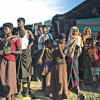Major challenges ahead
Bangladesh may face enormous economic challenge in the coming days unless the Rohingyas are repatriated fast and the international community comes up with adequate humanitarian assistance, economists have said.
Most of the fund so far has been provided by the foreign donors to address the emergency needs, but they may lose their interest in the long run, said the experts.
The observations came at a discussion titled “Economic Implications of Rohingya Crisis for Bangladesh and National Budget”, organised by the Centre for Policy Dialogue (CPD) in association with Transparency International Bangladesh and held at a hotel in the port city.
Some 700,000 Rohingyas have crossed over into Bangladesh, fleeing atrocities in Myanmar since late August last year, joining some 300,000 others who had fled earlier waves of violence in Rakhine State. Over 300,000 local people have been affected by the influx.
In the first phase from September to December 2017, the fund required to provide humanitarian assistance to the Rohingyas was $434 million. Bangladesh contributed $4.37 million, said CPD Executive Director Dr Fahmida Khatun yesterday.
The UN in its joint response plan appealed for $950 million for March-December 2018 to meet the emergency needs of the Rohingya and local community. At least 25 percent of the total fund has been planned for the host community.
According to the UN, only 16 percent of the fund sought has been confirmed so far.
“If the crisis lasts long, donors at one stage may lose interest in providing funds for the Rohingyas as several human catastrophes are emerging across the globe,” Fahmida said.
Without funds from the international community for the humanitarian needs of the Rohingyas, Bangladesh will face a serious challenge, she said at the discussion, attended by local politicians, civil society members and human rights groups.
She also expressed concern that the Rohingya repatriation has not begun yet.
As per the repatriation deal signed between Bangladesh and Myanmar in November last year, 300 Rohingyas are supposed to be repatriated every day. In that case, it will require seven years to complete the repatriation.
Over that seven years, Bangladesh will have to spend $4,433 million. If repatriation takes eight years, the cost will soar to $5,898 million, and to $10,456 million if it takes 12 years, according an analysis by the CPD.
CPD Distinguished Fellow Dr Debapriya Bhattacharya said Bangladesh has now become the fifth largest country in terms of sheltering a sheer number of refugees.
“It will be a great challenge for us to retain the attention of donors who are funding as of now. If they take away their attention, the whole burden will be on our national budget. So, we have to work proactively to accelerate the process of repatriation,” he said.
Debapriya emphasised the importance of special allocation for host communities in the next budget.
According to the CPD analysis, so far 6,000 acres of forest worth Tk 714 crore has been destroyed by the Rohingyas.
The refugees collect 700 tonnes of firewood from the forest every day, according to aid agencies.
The CPD said if the Rohingyas continue to collect firewood at the current pace, Teknaf Wildlife Sanctuary, Inani National Park and Himchhari National Park will be endangered.
Professor Emeritus Alamgir Md Siraj of Chittagong University and Maj (retd) Emdadul Haque also spoke at the programme.

 For all latest news, follow The Daily Star's Google News channel.
For all latest news, follow The Daily Star's Google News channel. 








Comments